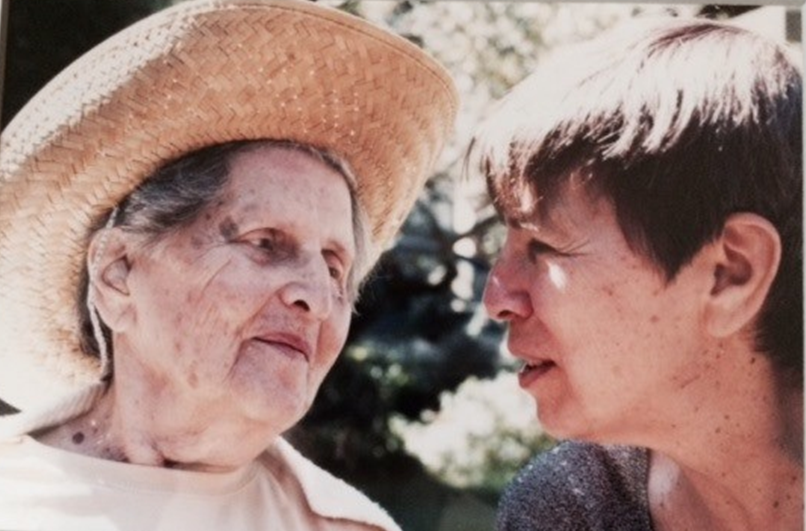Marian Knapp understands a lot about aging – and she writes to help others connect with the process. “People tell me how helpful it is that I’m writing in a way that people are actually experiencing life, and in particular, getting older,” She said. “I want to let people know they’re not alone.”
For nearly two decades, Knapp has written five books, a Newton TAB column, and her own blog to challenge ever-prevalent stereotypes surrounding aging. Her writing helps people understand the experiences of their older friends and family – and to be ready for their own aging. Throughout all her observations and advice is a mantra: “There’s a brain behind that gray hair.”
Knapp’s experience with aging began decades ago. Born and raised in Providence, Rhode Island, Knapp moved to Newton in 1970 to stay close to her aging parents. After graduating from Boston University in 1956 with a degree in English, Knapp followed a trajectory expected of women at the time: marrying, having two children, and staying at home to raise them. Few work options were available to women of her generation. “You could become a teacher, you could become a secretary, or you could become a nurse,” Knapp explained.
Yet as her children grew, she began to find her independence, increasingly getting more involved within the greater Boston community. In 1973, Knapp trained and worked as a telephone counselor at Planned Parenthood, then transitioned to working as an abortion counselor for a clinic in Brighton. “I wanted to…be involved with what was going on,” Knapp said. Eventually, a coworker’s husband offered her a regular job, where she worked for ten years. During this time, her relatives aged, and Knapp cared for them. “I was working in the community, and I was taking care of a whole bunch of older people, all of whom were in some stage of dying,” Knapp said. “I began to realize …that I was going to get old. I would get to that point at some time in my life.”
These realities of aging began to hit with sharp clarity. “I didn’t want to make a bucket list,” Knapp said, “But I wanted to reflect on the one thing I would regret not doing …the first thing that popped into my head was to go get a PhD.” So Knapp applied, and got accepted, to graduate school at Antioch University New England. At the age of 70, she received her PhD in environmental studies. “I didn’t think it was amazing. I just thought this is what I have to do. And actually, that decision sort of set the stage for me to pay attention to really understanding what was important to me and what I really wanted and needed to do with my life.”

Becoming a Writer
During her time at Antioch University, Knapp published her very first work, an essay on the “resilience of memory” that she had initially written as an extra-credit assignment. “[My professor] said, ‘You should get that published.’ And that was the first time …I realized that I could write.” She subsequently published the piece in the Antioch Literary Magazine. “When I realized [I could write], I said, ‘Oh, my God, I’m a writer.’ It was like an epiphany …I said, ‘No, that can’t be. That can’t be.’ And then I said, ‘Yeah, I’m a writer.’ And so I kept writing.”
This new awareness of her purpose in the world around her, coupled with the aging of the people around her, motivated her to pry further into the inevitable process of age. “I was really focused on having had all this experience with …being with older people …What really happens when people get old? …What is their world like?” These questions culminated in her dissertation, Aging in Place in Suburbia.
On a whim, Knapp submitted an essay — an expansion of her dissertation — to the Newton TAB, starting a more-than-ten-year partnership with the paper, where she wrote a column on aging. After the TAB curtailed local coverage and ended its print edition, Knapp published her writing on her own website. Besides her books, her reach now extends to a mailing list of over five hundred people, with an additional five hundred from her residential area. “I do this not because I want to be famous,” Knapp said. “I’m doing this because people tell me how helpful it is that I’m writing in a way that people are actually experiencing life, and in particular, getting older, so that’s what I want to do. I want to let people know they’re not alone.”
Pursuing a Purpose
There’s a simple method to staying sane while aging, Knapp says. One must find a purpose, “As simple as possible and keep pursuing it.” For Knapp, this translates into publishing her stories. In addition to her blog and column, Knapp has written five books. Her first was an expansion of her dissertation, followed by: Aging in Places: Reflective Preparation for the Future; A Steadfast Spirit: The Essence of Caregiving; The Outermost Cape: Encountering Time; Prohibition Wine; and South Providence Girls. Knapp is working on her sixth book, a story about her mother.
While writing South Providence Girls, Knapp suffered a stroke, leading to deeper introspection on her purpose. “After that stroke, I thought a lot about what my purpose was, and I decided that my purpose was to tell the story, whatever the story was, and especially if it was a story that if I didn’t tell it, it would disappear. …[W]hen I had that stroke, I was close to finishing up my last book, the South Providence Girls. …I managed to finish it and get it out, and get it published, and do presentations on it, within months after.”
Knapp’s work emphasizes the small things in life, from old photographs to jigsaw puzzle pieces – a sentiment that informs how she views aging and her relationship with others. “There’s a couple across the hall from me. They’re both in their 90s, and he’s dying. He has esophageal cancer. And so what can I do? I can’t change that, but what I can do is ring her doorbell and bring her a piece of homemade coffee cake. Because in that way, in that small way, I can, for a few minutes, help this one person feel taken care of.”
Perspectives on Aging
Growing old can be isolating, especially coupled with societal expectations to look young. “A number of years ago, I had been coloring my hair, but writing about acknowledging and not denying aging. And then I said, ‘Wait a minute, if I want to demonstrate that, I have to stop coloring my hair, and let it go gray,’ …I’m not trying to pretend that I’m young.”
Knapp’s emphasis on acknowledging the aging process has impacted the way she has interacted with the Newton community. Serving on the Newton Council for Aging for over a decade, Knapp recalls feeling frustrated about the debate surrounding older people. “Should they people be called seniors? Should they be called elders? Should they be called older people? …There was a lot of ‘them’, ‘they’ versus ‘us’ …Whatever you call it, [it] doesn’t do away with the fact that people get old, right?”
For Marian, the change of language about the aging process serves only as a form of denial, which in turn poses a major hurdle for those navigating the process. “[The] societal image of what an older person is …[that they’re] a child, and that’s what drives me nuts, that people will say, ‘Oh, Hi, dear,’ ‘Hi, honey,’ as if I’m some kind of kid. …Our society denigrates older people.”
Knapp sees that her writing about aging gives her agency to shape her own narrative, serving as an inspiration to the community around her. When asked about what motivates her to push on in the face of aging, Knapp said, “The most important thing is to keep my mind active and keep setting important goals that are realistic for me at this point in life …keeping yourself relevant in some way.”
Noa Kelmer-Racin is a Fig City News student reporter and a sophomore at Princeton University.







